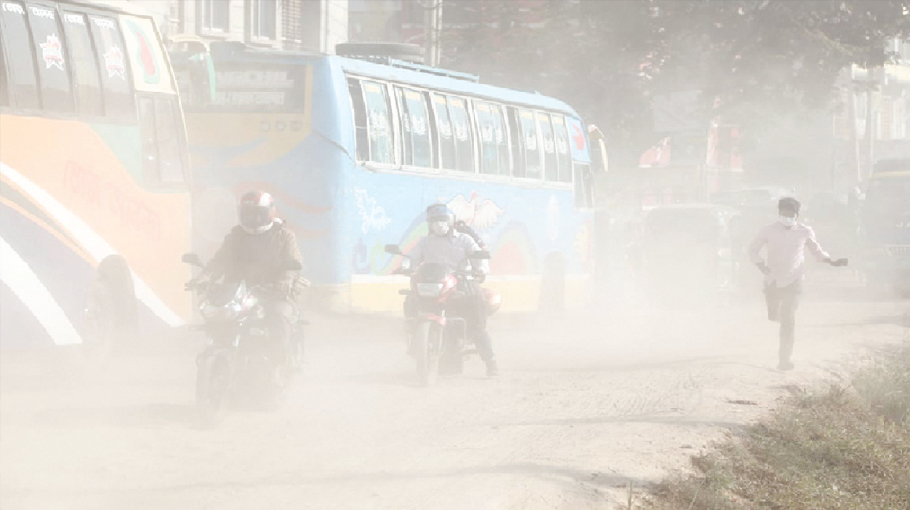Dhaka’s air pollution worst in last 2 months

Dhaka often ranks the worst world city in the Air Quality Index (AQI). Road excavation, construction activities, industries, brickfields and vehicles are considered as major sources of air pollution in the capital city of Bangladesh.
The air pollution in the city has not decreased even though construction work for development projects has decreased compared to the previous years. However, the air pollution of the last two months in Dhaka city has broken all the records in the last seven years.
Experts on air pollution and environmentalists said that reduction of rainfall is mainly responsible for the increase of air pollution in the city despite the reduction in the construction of development projects.
Besides, overpopulation, geographical location, poor urban planning and burning of waste contribute to air pollution in the city. Lack of proper implementation of the existing laws, rules and policies related to the public health and environment is also responsible.
“A major reason for the increase of air pollution is lack of rainfall. Although construction work of many development projects was completed last December, there has been no rain since then,” Prof Dr Ahmad Kamruzzaman Majumder, a leading expert and researcher on air pollution, told Bangladesh Post on Monday.
Center for Atmospheric Pollution Studies (CAPS) of Stamford University, Bangladesh carries out regular research on air pollution in Dhaka as well as other regions in Bangladesh.
According to the latest research of the CAPS, the highest air pollution in the last seven years has occurred in the first two months of this year. However, the month of January 2023 was at the top position, breaking all the records of the last seven years. Ten days in this month were extremely unhealthy. In the rest of the days, there was not even a single day of fresh air.
On the other hand, although the pollution in February decreased slightly compared to January, the air pollution in this month was also relatively high compared to the last seven years.
As a result, February took the second place of most polluted month in seven years. The observation of the first 23 days of this month says that the air of Dhaka was not clean even on a single day in 23 days. Besides, the rest days were unhealthy, 14 days were very unhealthy and three days were extremely unhealthy.
Prof Dr Ahmad Kamruzzaman Majumder, founder the CAPS and chairman of the environmental science department of Stamford University, is head of the research team.
According to CAPS, the air pollution in Dhaka has increased by eight per cent in 2023 compared to last year. In 2022, where the average air quality of Dhaka was 214 AQI, in 2023 it stood at 231 AQI.
A review of the past seven years of air quality averages by CAPS shows that the average air quality for the past years was 221 AQI. But this year’s air quality average stands at 231 AQI.
Talking to Bangladesh Post, Prof Dr. Ahmad Kamruzzaman Majumder said, “We thought that since the construction work of development projects in Dhaka has decreased compared to the previous years, the air quality will also improve slightly. But it didn’t happen. A major reason for this is that although the works were completed last December, there has been no rain since then. Rain may reduce air pollution a bit.”
He also said that burning of waste has become a major area of Dhaka’s air pollution. It is gradually taking the air in the city from harmful to very harmful level. It needs a lot of attention, he suggested.
He, however, suggested reconsideration of the Air Pollution (Control) Rules, 2022 and its proper implementation.
Muhammad Anowarul Hoque, secretary general at Save Our Sea, also called for reconsideration of the Air Pollution (Control) Rules, 2022 in order to control the air pollution in the country.
He, however, said that removal of pollutants from the atmosphere is important to check air pollution. “Rain helps us in this regard as the rain plays a vital role in removing pollutants from the air,” he added.




